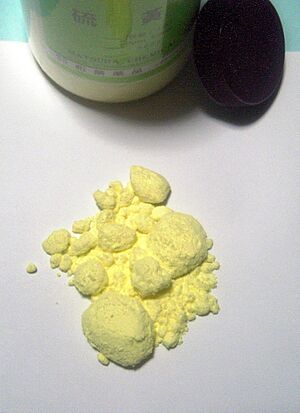Reagent facts for kids
A reagent is a special chemical that scientists use to find out if another chemical is present, or to make a chemical reaction happen. Think of it like a detective's tool! When you add a reagent to something, it usually causes a clear change. This change can be a new color appearing, a solid substance forming, or even bubbles of gas.
For example, a chemical called potassium dichromate can be used to test for alcohol. If alcohol is there, the orange potassium dichromate will turn green. Another example is using nitric acid to test for gold. If gold is present, the nitric acid won't react with it, but it will react with other metals.
Contents
What Are Reagents Used For?
Reagents are super important in many areas of science, especially in chemistry. They help scientists:
- Identify substances: Figure out what a mystery substance is.
- Measure amounts: See how much of a certain chemical is in a sample.
- Make new chemicals: Start or speed up chemical reactions to create different compounds.
How Do Reagents Show a Change?
When a reagent reacts with another substance, it often gives a clear sign that something has happened. Here are some common changes you might see:
- Color Change: The most common sign! The mixture might turn a completely different color.
- Precipitate Forms: A solid substance might appear and settle at the bottom of the liquid. This solid is called a precipitate.
- Gas Bubbles: You might see bubbles forming, which means a gas is being produced.
- Temperature Change: The mixture might get hotter or colder, showing a reaction is happening.
Everyday Examples of Reagents
You might not realize it, but reagents are used all around us:
- Pool Testing Kits: These kits use reagents to check the levels of chemicals like chlorine in swimming pools.
- pH Paper: This paper changes color to tell you if something is an acid or a base. The chemicals on the paper are reagents.
- Baking: When you mix baking soda (a base) with vinegar (an acid), they react and produce carbon dioxide gas, which makes cakes rise. Baking soda and vinegar act as reagents in this simple kitchen reaction.
Types of Reagents
There are many different types of reagents, each designed for specific tasks. Some are very general and react with many things, while others are very specific and only react with one particular chemical.
- Analytical Reagents: These are used to find out what chemicals are in a sample or how much of them there are. They help scientists analyze substances.
- Synthetic Reagents: These are used to create new chemical compounds. They are like building blocks for making new molecules.
- Biological Reagents: These are used in biology and medicine to study living things, like testing for diseases or understanding how cells work.
Reagents are essential tools that help us understand the world around us, from the smallest molecules to large industrial processes.
Related pages
See also
 In Spanish: Reactivo para niños
In Spanish: Reactivo para niños
 | William Lucy |
 | Charles Hayes |
 | Cleveland Robinson |


